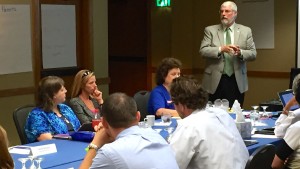Members of the new committee charged with digging into teacher evaluations received their first taste Tuesday of how difficult their job is.

Committee members met for nearly nine hours Tuesday at a Red Lion Hotel in Boise, the panel’s first meeting since the group was named last week.
Pete Koehler, Superintendent Sherri Ybarra’s interim chief deputy superintendent, laid the groundwork shortly after the meeting opened.
“What you are embarking on is at the top of the list of what we are trying to do for children,” Koehler said. “It might sound like a fairly easy conversation, but it is not. There are splits across the state on how this thing needs to be handled.”
Teacher evaluations are important because, for the first time, they are tied to the expenditure of taxpayer money and a teacher’s ability to advance through the Legislature’s estimated $250 million career ladder salary law.
“Make no mistake,” Koehler warned the committee. “This is tied directly into the career ladder, and to pretend otherwise is wrong.”
Members of the new committee are charged with developing recommendations for how State Department of Education officials will audit a random sample of teacher evaluations, as outlined in the career ladder law. But their mission extends further. Koehler instructed them to identify purposes for teacher evaluations, consider whether the Charlotte Danielson Framework for Teaching is the most appropriate tool for evaluations or whether another option would be more appropriate and to recommend next steps in the evaluations process.
Committee members, including teachers, administrators, a school board member and higher education officials, began the session by delving into the philosophy behind evaluations.
“It can be used as a hammer,” Bonneville Director of Human Resources Shalene French said. “Or is this a way to develop a statewide pool of knowledge, good practices and access that other districts can draw from and support our teachers?”
French stressed improving teaching should be a major goal.
Several members wrestled over how to balance a teacher’s need for professional growth and development with accountability measures that some lawmakers and administrators expect.
“It seems to me a very clear purpose… of this… is clearly to provide legislators some piece of mind that their investment in the career ladder is being implemented in a way that is going to benefit the students,” Taylor Raney, the University of Idaho’s director of teacher education, said.
Committee members worked in small groups to discuss evaluation rules and practices before bringing their suggestions to the committee as a whole.
By Tuesday afternoon, they identified several aspects of teacher evaluations that auditors should be able to double-check for quality, including whether evaluations are complete and aligned to Danielson’s Framework for Teaching, whether the evaluations properly weighted student achievement and professional practice and whether the frequency of teacher evaluations was fair and consistent.
At several points, committee members discussed what Koehler described as “a controversy” involving public perception of evaluations. Last month, Idaho Education News relied on public records to report that administrators in 32 of the state’s 115 school districts awarded identical, overall evaluations scores to all of their teachers. Additionally, retiring New Plymouth superintendent and House Education Committee member Ryan Kerby said his district purposely awarded identical scores to all of his districts’ teachers because officials there don’t believe “the state needs to know all the individual teacher data.”
“I think you have to be somewhat oblivious to not know there is even some controversy going on right now over what is an average score for a teacher and what does it mean,” Koehler said Tuesday.
Ybarra was in Boston attending a Council of Chief State School officers meeting and unable to attend the evaluations summit.
Committee members are scheduled to resume their work at 8 a.m. Wednesday at the same hotel.
Once their work is complete, committee members will be expected to issue reports to the Legislature, State Board of Education and the dean’s of Idaho’s teacher education programs.
